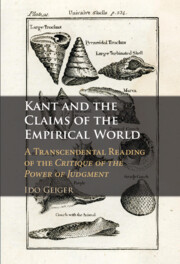 Kant and the Claims of the Empirical World
Kant and the Claims of the Empirical World Published online by Cambridge University Press: 30 April 2022
Chapter 5 argues that the feeling of harmony expressed by pure aesthetic judgments is to be understood as the promissory feeling that a sensible manifold can be brought under concepts. The manifold which evokes in us this particular feeling of cognitive purposiveness makes us subconsciously identify it as an object exemplary of a natural kind, even before we have found concepts under which to subsume it and its kind. Furthermore, it is only on the assumption that the same manifolds will bring about this feeling in all of us that we will be able to make cognitive judgments about the same objects. Pure aesthetic judgments underwrite our pre-conceptual identification of spatial forms as exemplary of objective natural kinds. It is a necessary condition of cognition that we carve up the manifold given to us in intuition into objects exemplary of natural kinds in the same manner. The assumption of a common sense is a necessary condition of objective empirical experience and knowledge. It grounds the appeal to universal assent, which aesthetic judgments express. The Critique of the Aesthetic Power of Judgment is an essential part of the transcendental account of the conditions of empirical experience and knowledge.
To save this book to your Kindle, first ensure no-reply@cambridge.org is added to your Approved Personal Document E-mail List under your Personal Document Settings on the Manage Your Content and Devices page of your Amazon account. Then enter the ‘name’ part of your Kindle email address below. Find out more about saving to your Kindle.
Note you can select to save to either the @free.kindle.com or @kindle.com variations. ‘@free.kindle.com’ emails are free but can only be saved to your device when it is connected to wi-fi. ‘@kindle.com’ emails can be delivered even when you are not connected to wi-fi, but note that service fees apply.
Find out more about the Kindle Personal Document Service.
To save content items to your account, please confirm that you agree to abide by our usage policies. If this is the first time you use this feature, you will be asked to authorise Cambridge Core to connect with your account. Find out more about saving content to Dropbox.
To save content items to your account, please confirm that you agree to abide by our usage policies. If this is the first time you use this feature, you will be asked to authorise Cambridge Core to connect with your account. Find out more about saving content to Google Drive.